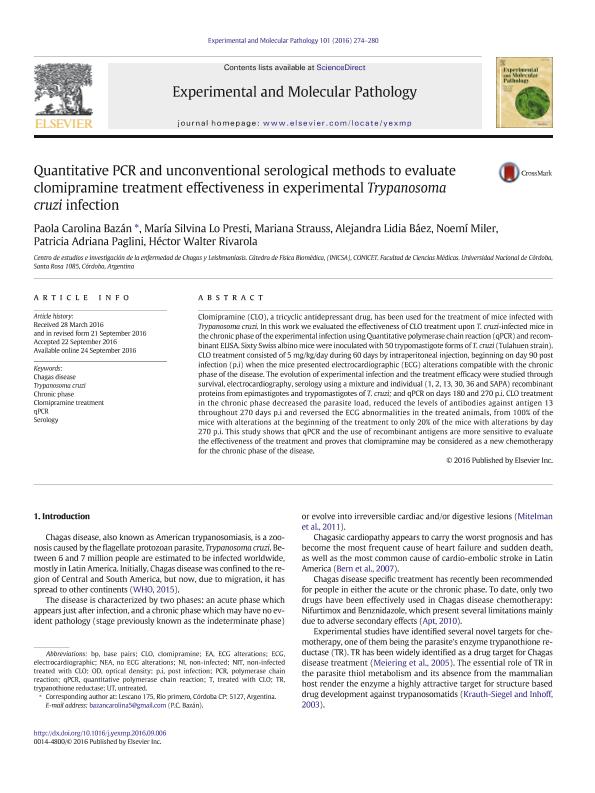Mostrar el registro sencillo del ítem
dc.contributor.author
Bazán, Paola Carolina

dc.contributor.author
Lo Presti, Maria Silvina

dc.contributor.author
Strauss, Mariana

dc.contributor.author
Báez, Alejandra Lidia

dc.contributor.author
Miler, Noemí del Carmen

dc.contributor.author
Paglini, Patricia Adriana

dc.contributor.author
Rivarola, Hector Walter

dc.date.available
2018-09-03T14:50:43Z
dc.date.issued
2016-10
dc.identifier.citation
Bazán, Paola Carolina; Lo Presti, Maria Silvina; Strauss, Mariana; Báez, Alejandra Lidia; Miler, Noemí del Carmen; et al.; Quantitative PCR and unconventional serological methods to evaluate clomipramine treatment effectiveness in experimental Trypanosoma cruzi infection; Academic Press Inc Elsevier Science; Experimental and Molecular Pathology; 101; 2; 10-2016; 274-280
dc.identifier.issn
0014-4800
dc.identifier.uri
http://hdl.handle.net/11336/58046
dc.description.abstract
Clomipramine (CLO), a tricyclic antidepressant drug, has been used for the treatment of mice infected with Trypanosoma cruzi. In this work we evaluated the effectiveness of CLO treatment upon T. cruzi-infected mice in the chronic phase of the experimental infection using Quantitative polymerase chain reaction (qPCR) and recombinant ELISA. Sixty Swiss albino mice were inoculated with 50 trypomastigote forms of T. cruzi (Tulahuen strain). CLO treatment consisted of 5 mg/kg/day during 60 days by intraperitoneal injection, beginning on day 90 post infection (p.i) when the mice presented electrocardiographic (ECG) alterations compatible with the chronic phase of the disease. The evolution of experimental infection and the treatment efficacy were studied through survival, electrocardiography, serology using a mixture and individual (1, 2, 13, 30, 36 and SAPA) recombinant proteins from epimastigotes and trypomastigotes of T. cruzi; and qPCR on days 180 and 270 p.i. CLO treatment in the chronic phase decreased the parasite load, reduced the levels of antibodies against antigen 13 throughout 270 days p.i and reversed the ECG abnormalities in the treated animals, from 100% of the mice with alterations at the beginning of the treatment to only 20% of the mice with alterations by day 270 p.i. This study shows that qPCR and the use of recombinant antigens are more sensitive to evaluate the effectiveness of the treatment and proves that clomipramine may be considered as a new chemotherapy for the chronic phase of the disease.
dc.format
application/pdf
dc.language.iso
eng
dc.publisher
Academic Press Inc Elsevier Science

dc.rights
info:eu-repo/semantics/openAccess
dc.rights.uri
https://creativecommons.org/licenses/by-nc-sa/2.5/ar/
dc.subject
Chagas Disease
dc.subject
Chronic Phase
dc.subject
Clomipramine Treatment
dc.subject
Qpcr
dc.subject
Serology
dc.subject
Trypanosoma Cruzi
dc.subject.classification
Enfermedades Infecciosas

dc.subject.classification
Ciencias de la Salud

dc.subject.classification
CIENCIAS MÉDICAS Y DE LA SALUD

dc.title
Quantitative PCR and unconventional serological methods to evaluate clomipramine treatment effectiveness in experimental Trypanosoma cruzi infection
dc.type
info:eu-repo/semantics/article
dc.type
info:ar-repo/semantics/artículo
dc.type
info:eu-repo/semantics/publishedVersion
dc.date.updated
2018-08-29T18:40:02Z
dc.journal.volume
101
dc.journal.number
2
dc.journal.pagination
274-280
dc.journal.pais
Estados Unidos

dc.journal.ciudad
Cambridge
dc.description.fil
Fil: Bazán, Paola Carolina. Consejo Nacional de Investigaciones Científicas y Técnicas. Centro Científico Tecnológico Conicet - Córdoba. Instituto de Investigaciones en Ciencias de la Salud. Universidad Nacional de Córdoba. Instituto de Investigaciones en Ciencias de la Salud; Argentina. Universidad Nacional de Córdoba. Facultad de Medicina. Departamento de Fisiología Humana y Física Biomedica. Cátedra de Física Biomedica; Argentina
dc.description.fil
Fil: Lo Presti, Maria Silvina. Consejo Nacional de Investigaciones Científicas y Técnicas. Centro Científico Tecnológico Conicet - Córdoba. Instituto de Investigaciones en Ciencias de la Salud. Universidad Nacional de Córdoba. Instituto de Investigaciones en Ciencias de la Salud; Argentina
dc.description.fil
Fil: Strauss, Mariana. Consejo Nacional de Investigaciones Científicas y Técnicas. Centro Científico Tecnológico Conicet - Córdoba. Instituto de Investigaciones en Ciencias de la Salud. Universidad Nacional de Córdoba. Instituto de Investigaciones en Ciencias de la Salud; Argentina
dc.description.fil
Fil: Báez, Alejandra Lidia. Consejo Nacional de Investigaciones Científicas y Técnicas. Centro Científico Tecnológico Conicet - Córdoba. Instituto de Investigaciones en Ciencias de la Salud. Universidad Nacional de Córdoba. Instituto de Investigaciones en Ciencias de la Salud; Argentina
dc.description.fil
Fil: Miler, Noemí del Carmen. Consejo Nacional de Investigaciones Científicas y Técnicas. Centro Científico Tecnológico Conicet - Córdoba. Instituto de Investigaciones en Ciencias de la Salud. Universidad Nacional de Córdoba. Instituto de Investigaciones en Ciencias de la Salud; Argentina
dc.description.fil
Fil: Paglini, Patricia Adriana. Consejo Nacional de Investigaciones Científicas y Técnicas. Centro Científico Tecnológico Conicet - Córdoba. Instituto de Investigaciones en Ciencias de la Salud. Universidad Nacional de Córdoba. Instituto de Investigaciones en Ciencias de la Salud; Argentina
dc.description.fil
Fil: Rivarola, Hector Walter. Consejo Nacional de Investigaciones Científicas y Técnicas. Centro Científico Tecnológico Conicet - Córdoba. Instituto de Investigaciones en Ciencias de la Salud. Universidad Nacional de Córdoba. Instituto de Investigaciones en Ciencias de la Salud; Argentina
dc.journal.title
Experimental and Molecular Pathology

dc.relation.alternativeid
info:eu-repo/semantics/altIdentifier/url/https://www.sciencedirect.com/science/article/pii/S0014480016302775
dc.relation.alternativeid
info:eu-repo/semantics/altIdentifier/doi/http://dx.doi.org/10.1016/j.yexmp.2016.09.006
Archivos asociados
